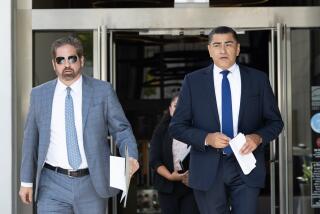Officer’s Wife Challenges Liquor License Ban : A Badge Could Take Booze Off the Menu
Sherri Maxfeldt operates the Stagecoach restaurant in the small North County community of Valley Center. She also sells beer and wine at the 54-seat diner. But the state says she’s breaking the law, even though the restaurant has a liquor license.
Her transgression: She is married to a cop, Donald George Maxfeldt Jr., a sergeant with the California Highway Patrol.
Under state law, police officers and their spouses are barred from holding liquor licenses because police are sometimes called upon to enforce state liquor laws, and thus could be put in a potential conflict of interest.
“The reason for the law is very simple,” said Pete Case, San Diego district administrator for the state Department of Alcoholic Beverage Control. “There may be times when a police officer has to police his own premises, and that could lead to conflicts.”
But Sherri’s lawyer, Judith Descalso of Escondido, believes the law is unconstitutional because it discriminates on the basis of marital status, and she plans to challenge it in court.
“Our position is she shouldn’t be denied (a license) because she’s married,” said Descalso. “What if they were just living together? Or he was her brother? We don’t think the law makes any sense.”
On Friday, Maxfeldt began what could eventually be a long legal journey when her case was heard before Willis Mevis, an administrative law judge in San Diego. Under the law, Maxfeldt must exhaust all administrative remedies before the matter can be taken to court.
Mevis will make a recommendation on the case to ABC headquarters in Sacramento, which will then issue a decision.
Maxfeldt’s story begins with June Knab, former owner of the Stagecoach restaurant, where Maxfeldt has worked as a hostess and waitress for almost five years. Knab wanted out of the restaurant and offered to sell it to Maxfeldt.
In October, 1984, an agreement transferring ownership to Maxfeldt was reached. The liquor license was included as part of the deal. But when Maxfeldt tried to file the necessary paper work with the ABC, she was told last March that she couldn’t have the license because of her husband’s job.
And the ABC went one step further. It sought to revoke the license issued to Knab, who is still the official holder, because of what it alleged was a failure to disclose the change in ownership.
Lawyers for both Maxfeldt and Knab said at Friday’s hearing that the two women never intended to cover up the ownership transfer and that they had cooperated with ABC officials from the start.
Descalso said that even if Knab’s liquor license is revoked, Maxfeldt will apply for a new one and contest the constitutionality of the ban on police officers’ spouses holding such licenses.
According to Case of the ABC, neither police officers nor their spouses can hold liquor licenses nor have an ownership interest in a business that sells alcoholic beverages. There is, however, an exception.
Spouses can obtain liquor licenses if the business is outside the jurisdiction of the law enforcement-employed spouse. But this provision doesn’t help Maxfeldt, even though her husband works in Temecula in Riverside County. State police officers, such as those in the CHP, are prohibited from holding a liquor license anywhere in California.
Maxfeldt, who said she has been in the restaurant business for 20 years, said her husband has no financial interest in the restaurant, even though one of his sons works there. She said she and her husband signed an agreement that makes the restaurant her sole and separate property.
More to Read
Sign up for Essential California
The most important California stories and recommendations in your inbox every morning.
You may occasionally receive promotional content from the Los Angeles Times.









